Darren N. Huckey's Blog
December 29, 2023
My My Heart To Yours
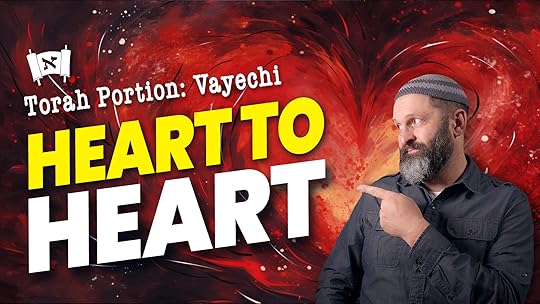 Parashat Vayechi (Genesis 47:28-50:26)
Parashat Vayechi (Genesis 47:28-50:26)For the last three portions, we have seen the story of Joseph unfold. Up until now, we have learned the main events of Joseph’s life. We learned about Joseph’s descent into Egypt through the seemingly unfortunate circumstances initiated by his brothers’ hatred toward him. But then we saw how God used this for His own purposes, placing Joseph in a strategic position to be the savior of not only his own family but also the world. We read about the reunion of Joseph and his family, and how he moved his father and all of his brothers down to Egypt so that he could take care of them. Now, in our final portion from the book of B’reisheet (Genesis), we learn about the final days of Jacob and his desire to bestow his blessings upon his children before his passing. The focal point of this portion is the individual blessings he gives to each of his sons, with the adoption and blessing of Joseph’s sons, Ephraim and Manasseh, being an unexpected turn of events.
From a detailed reading of the text, we can learn numerous lessons from this narrative. One lesson is tucked away toward the end of the portion and may easily be glossed over by a surface reading. After Jacob dies, Joseph’s brothers realize that up to this point Jacob may have been the only buffer between them and their brother’s vengeance. They knew how bad they had treated him and fully expected retaliation after their father’s passing. So, they devised a plan. They told Joseph that before Jacob had died, he told them to convey a message to Joseph that he was not to harm his brothers or take revenge on them. When Joseph listened to his brothers, however, he wept. It hurt him to realize that his brothers believed he had malicious intent toward them. He quickly cleared up the matter:
But Joseph said to them, “Do not fear, for am I in the place of God? As for you, you meant evil against me, but God meant it for good, to bring it about that many people should be kept alive, as they are today. So do not fear; I will provide for you and your little ones.” Thus he comforted them and spoke kindly to them. (Genesis 50:19–21)
We are told that Joseph “comforted them and spoke kindly to them” (v. 21). However, our English translations don’t fully capture what the Torah is saying here. Virtually all English translations say that Joseph “spoke kindly to them.” However, the phrase the Torah uses is vay’dabeir al-libam. A more literal reading of the Hebrew is that Joseph “spoke to their hearts.” What does it mean to speak to a person’s heart? It means to connect with them intimately. It means to speak to them from one’s own heart. An oft-repeated Jewish expression says, “Words from the heart enter the heart.” When we speak from our hearts, others are receptive to our message and it enters their hearts.
However, a heart that is full of darkness will also spread that darkness to others. Depending on what is in our hearts, others will receive from us either light or darkness. Yeshua tells us that “what comes out of the mouth proceeds from the heart, and this defiles a person” (Matthew 15:18). He also warns us, “If then the light in you is darkness, how great is the darkness!” (Matthew 6:23). Our hearts are reservoirs from which our lips draw. Whatever is in our hearts will naturally pass through our lips and into the hearts of others:
The good person out of the good treasure of his heart produces good, and the evil person out of his evil treasure produces evil, for out of the abundance of the heart his mouth speaks. (Luke 6:45)
How do we ensure that our hearts are spreading light rather than darkness? If our hearts are filled with Torah and the teachings of our Master, then we will be filled with light. We need to have a constant diet of these things in order to illuminate our hearts. Otherwise, darkness will overtake us.
When we speak to others, are they hearing our words or hearing our hearts? We should be speaking from one heart to another—from my heart to your heart. Only then will our hearts be one, united for the purposes of the Kingdom.
Chazak! Chazak! V’nitchazeik! Be strong! Be strong! And may we be strengthened!
December 15, 2023
Messiah Unmasked
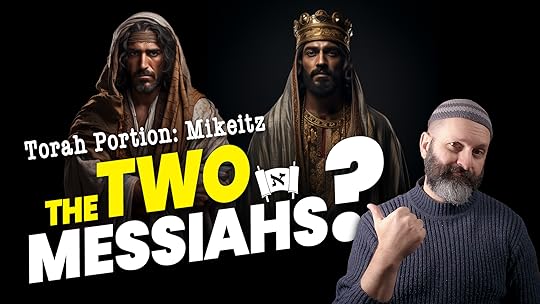 Parashat Mikeitz (Genesis 41:1-44:17)
Parashat Mikeitz (Genesis 41:1-44:17)At the end of last week’s parashah, we were left with a cliff hanger. Pharaoh’s royal baker was executed and his chief cupbearer was restored to office just as Joseph had told them, based on their respective dreams. The very last verse, however, left off by telling us, “Yet the chief cupbearer did not remember Joseph, but forgot him” (Genesis 40:23). Although the royal cupbearer was restored to his position, Joseph was forgotten and left in prison.
However, our parashah picks up two years later when God orchestrated that Pharaoh have two disturbing dreams. They would trouble Pharaoh enough for him to make a ruckus among his royal court searching for an interpreter for them. Finally, the cupbearer remembered Joseph and brought him before Pharaoh to interpret his dreams. The result was that Pharaoh installed Joseph as the most powerful man in Egypt, second only to himself:
And Pharaoh said to Joseph, “See, I have set you over all the land of Egypt.” Then Pharaoh took his signet ring from his hand and put it on Joseph’s hand, and clothed him in garments of fine linen and put a gold chain about his neck. And he made him ride in his second chariot. And they called out before him, “Bow the knee!” Thus he set him over all the land of Egypt. Moreover, Pharaoh said to Joseph, “I am Pharaoh, and without your consent no one shall lift up hand or foot in all the land of Egypt.” And Pharaoh called Joseph’s name Zaphenath-paneah. (Genesis 41:41–45)
This was an incredible windfall for Joseph. He had gone from rags to riches, literally overnight. God had brought him from the dungeon to the king’s palace and given him authority over the entire kingdom of Egypt.
One of the first things that Pharaoh did when he installed Joseph into his new office was to give him the keys to his second-best chariot and have his officers drive him around Egypt. When Joseph was riding in Pharaoh’s chariot, Pharaoh’s officers would call out before Joseph something that is not quite clear. They would cry out, “Avrech!” (Genesis 41:43). What does this mean? Rabbinic commentaries debate over its meaning. Rabbi Yehudah says that it refers to Joseph, “who was a father (av) in wisdom and young (rach) in years.” Rabbi Yosi ben Dormaskit disagrees and sees a connection with the word avrech to the Hebrew word for knees (birkayim), making it a command for all who hear to “bend the knee” (Sifrei Devarim 1:21).
Virtually all English translations take Rabbi Yosi’s lead and associate this word with the bending of the knee. To fully understand this, we must understand the connection between Joseph and Yeshua. Joseph is a messianic prototype, just as King David. Rabbinic commentaries discuss two messiahs that will come. The first is a messiah who will come in a similar manner as Joseph. He has the title of Mashiach ben Yoseph, or Messiah Son of Joseph, because he is destined to suffer like Joseph. The second will be a conquering king, appropriately known as Mashiach ben David, or Messiah Son of David.
We know that, in his first appearance, Yeshua of Nazareth fulfilled the role of this suffering servant. However, one day he will return to reveal himself as the one who will subdue all of the enemies of God and restore the Kingdom to Israel. He will return as Mashiach ben David.
This passage in our Torah portion is the thread that ties these two messianic roles together. As Joseph is paraded throughout the land of Egypt, the cry went forth, “Avrech!”—“Bow the knee!” However, the knee was bent for the suffering servant, rather than the conquering king. Maybe this is the proleptic picture that Paul had in mind when he wrote to the congregation at Philippi:
Therefore God has highly exalted him and bestowed on him the name that is above every name, so that at the name of Jesus every knee should bow, in heaven and on earth and under the earth, and every tongue confess that Jesus Christ is Lord, to the glory of God the Father. (Philippians 9–11)
The name Zaphenath-paneah has a connection to this concept also. Rabbi Johanan said the name implies, “He reveals things that are hidden and easily declares them” (Genesis Rabbah 90:4).
Maybe Joseph was given the name Zaphenath-paneah to denote that he was hidden and then revealed. And just like Joseph, Yeshua has been hidden from the majority of his brothers and sisters for nearly two thousand years. However, one day the cry of “Avrech!” will be uttered once again, and every knee will bow and every tongue confess that Yeshua is both Messiah of Israel and Master over all. He will take off the mask he has been wearing and will no longer be seen as simply the Messiah of the Gentiles but the Messiah of Israel also. He who was hidden will be revealed, and his brothers will look upon him with astonishment and love as if they had seen their brother come back from the dead. It will be a glorious reunion.
October 27, 2023
Abraham The Soul-Maker
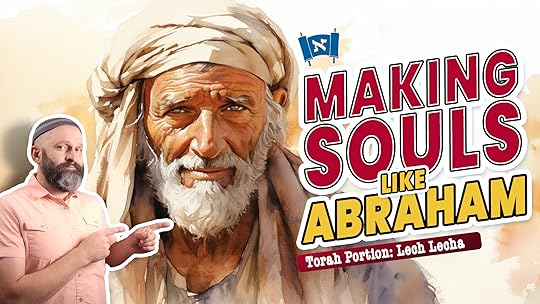 Parashat Lech Lecha (Genesis 12:1-17:27)
Parashat Lech Lecha (Genesis 12:1-17:27)At the end of last week’s Torah portion, we were introduced to one of the most important characters in the Torah: the patriarch Abraham. At this time, however, he is simply known as Abram. Abram is the foundational material that Hashem uses to build both a people and a faith. Today, he is affectionately referred to as Avraham Avinu, Our Father Abraham. In the Apostolic Scriptures, he is also called the father of all who believe (Romans 4:16). In this week’s Torah portion, we read about the calling of Abram and how God commissioned him with a special purpose. The LORD also changes his name from Abram to Abraham as a promise of what the LORD was going to do through Abraham.
A curious passage in our portion begs to be explained, however. When God calls Abram to leave his family and his homeland, we read of Abram’s response:
And Abram took Sarai his wife, and Lot his brother’s son, and all their possessions that they had gathered, and the people that they had acquired in Haran, and they set out to go to the land of Canaan. (Genesis 12:5)
The Torah tells us that Abram and Sarai left with Lot, their possessions, and “the people that they had acquired.” A hyper-literal reading of the original Hebrew, however, says that Abram and Sarai set out with “the souls they had made.” The Midrash takes issue with this phrasing:
If all the nations assembled to create one insect, they could not endow it with life. Yet the Torah says, “And the souls that they had made in Haran!” This refers to proselytes. (Genesis Rabbah 84:4)
The Midrash tells us that the people that Abram and Sarai “made” were actually proselytes. In other words, Abraham didn’t just acquire slaves or servants in Haran. He made disciples. We can see evidence of this just two chapters later (Genesis 14:14). When Abraham sets out to rescue Lot from his captors, it says that he took 318 of his “trained men” who were “born in his house” into battle. The Hebrew word here for “his trained men” (chanichav) means “follower” and has the basic meaning of something that is dedicated or devoted. It’s the same root that we get the word Hanukkah from, meaning dedication. These dedicated men were somehow “born” into Abraham’s house.
Later on in Genesis 17:23, the Torah distinguishes between Abraham’s slaves and his disciples when it lists those whom Abraham had circumcised. It says that he circumcised “all those born in his house or bought with his money.” The slaves were “bought,” while the disciples were “born.” Those who were “born” to Abraham were those who experienced a spiritual rebirth.
The Midrash says that a person who converts a pagan from his idolatry is like one who has created him (Genesis Rabbah 39:14). Rambam, in his Mishneh Torah, says that the honor due one’s teacher is greater than the honor due one’s father. Why? Because a person’s father brings him into the life of this world, while his teacher, the one who teaches him wisdom (i.e. the Torah), brings him into the life of the world to come. Abraham’s investment into his disciples gave them the dedication to follow him even into death.
It was for this reason that the Almighty specifically chose Abraham to be called out from among his people. The LORD said, “For I have chosen him, that he may command his children and his household after him to keep the way of the LORD by doing righteousness and justice” (Genesis 18:19). It says that Abraham will teach not only his children but also “his household.” Abraham proved these words to be true not only with Isaac but also with his 318 disciples.
All of this lets us know that Abraham invested into others. Abraham was a disciple-maker. How did Abraham make disciples? He and Sarah were known for their hospitality. They would continually have people in their homes, feeding them and teaching them about the one true God. They invested their time, their energy, and their resources into those whom they were discipling. Are we following in the footsteps of our father Abraham and making disciples as he did? If not, it’s never too late. Just take time to invest into others, loving them and teaching them how to live out the principles of Scripture. Better late than never. Let’s be soul-makers like our father Abraham.
September 1, 2023
The Responsibility of Influence
 Parashat Ki Tavo (Deuteronomy 26:1-29:8)
Parashat Ki Tavo (Deuteronomy 26:1-29:8)Parashat Ki Tavo is so named because of its open verse, which says, “When you come into the land that the LORD your God is giving you for an inheritance and have taken possession of it and live in it …” (Deuteronomy 26:1). The words ki tavo mean “when you come.” Thus, this parashah is focused on the responsibility of the Children of Israel when they arrive in the land promised to them by Hashem. The first few paragraphs address bringing the bikkurim, the first fruits of the land to the LORD and the ceremony surrounding this procedure. After this Hashem gives Israel a reminder of their responsibility as a people who are consecrated to the LORD:
This day the LORD your God commands you to do these statutes and rules. You shall therefore be careful to do them with all your heart and with all your soul. You have declared today that the LORD is your God, and that you will walk in his ways, and keep his statutes and his commandments and his rules, and will obey his voice. (Deuteronomy 27:16–17)
Immediately following this, instructions are given to renew the covenant through a ritual which includes dividing up the tribes and set them onto two mountains: the Mount of Blessing (Mount Gerizim) and the Mount of Curses (Mount Ebal). The Levites are to command them from the valley between the two. The ones on Mount Gerizim are to bless the nation and the ones on Mount Ebal are to repeat a series of curses, to which all of the people will affirm, “Amen.” The specific curses that are to be recited are listed in verses 15-26. Two of these, however, are connected in a way that may not be obvious at first. Let’s look at these two curses and find the link between them:
“Cursed be anyone who misleads a blind man on the road.” And all the people shall say, “Amen.” (Deuteronomy 27:18)
“Cursed be anyone who does not confirm the words of this law by doing them.” And all the people shall say, “Amen.” (Deuteronomy 27:26)
The first verse we can understand in a much broader sense by extending this prohibition to include misleading the spiritually blind. Indeed, our sages teach us that this is the extended meaning of this passage and that we should be ever on our guard against misleading someone who does not have the spiritual capacity to discern our actions. This passage is about leading someone astray. We should not lead a spiritually blind person down the wrong path. The second verse, however, seems to merely be a rebuke against anyone failing to uphold the commandments of the Torah. How are these two related?
Moses ben Nachman, otherwise known as Nachmanides or Ramban, understands the phrase “anyone who does not confirm the words of this law” to apply to anyone who has the ability to influence others to follow the path of Torah, but chooses not to. He says that it applies especially to those who are well-studied (but only concerned about their own spirituality) and to those in leadership roles. Rather than simply being a rebuke against failing to observe the Torah’s instructions, Ramban understands this to be a rebuke against passiveness in our responsibility to influence others for the good.
Let’s face it. Leadership is influence. Leaders are held to a higher responsibility because of this. The behavior of a leader influences the behavior of their followers, either positively or negatively. If a person is truly a leader, it doesn’t take much effort for to influence people to take action. They can either lead people to Torah and mitzvot or lead them to a path of destruction.
But this is not limited to those who are in the limelight. We are all leading people one direction or another, because we all have some sort of influence. Some of us have a greater influence over people than others. Some of us have an influence over larger numbers of people. But neither the magnitude nor the volume of people we are influencing negates this principle. We have a responsibility to lead the blind on the proper path and uphold the words of the Torah in the eyes of all who see us. We must take this responsibility seriously. If we are cognizant of the fact that we are influencing others—either for the good or for the bad—then we should be using that influence to lead people on a path that will bring them into a closer relationship with their Creator. How will you use your influence today?
Tags: deuteronomyki tavoleadershipinfluenceresponsibilityAugust 18, 2023
Love And War, And Everything In Between
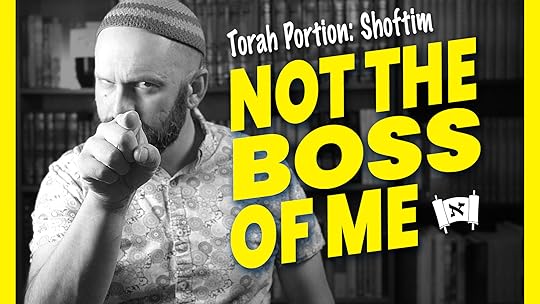 Parashat Shoftim (Deuteronomy 16:18-21:9)
Parashat Shoftim (Deuteronomy 16:18-21:9)We’ve all heard the familiar expression, “All is fair in love and war.” But according to the Torah, this is not a true statement. According to the Torah, both love and war have parameters attached to them. The Torah specifically instructs us in the manner we are to “love the LORD your God” in multiple places. It tells us the “how” of loving a God who is beyond human logic. For instance, we are told that loving God includes: keeping His commandments (Deuteronomy 10:12–13; 11:1); teaching His instructions to our children (Deuteronomy 6:7); not heeding false prophets (Deuteronomy 13:3); loving and caring for the stranger, the orphan, and the widow (Exodus 22:21–22); bringing to the LORD the first fruits of our grain, wine, and oil within the land of Israel (Numbers 18:12); etc. Another expression of our love for God can be found in this week’s portion:
You shall not sacrifice to the LORD your God an ox or a sheep in which is a blemish, any defect whatever, for that is an abomination to the Lord your God. (Deuteronomy 17:1)
Sometimes we may be tempted to think that at least doing something is better than nothing, but this is our own feeble minds trying to impose our humanity on a holy and transcendent God. The LORD requires that everything we bring to Him be without blemish, calling anything less than this “an abomination.” And although this specifically is connected to animals that are offered in the Holy Temple in Jerusalem, this principle can equally be applied to what we are able to bring to Him in a time when the Temple is not standing. When we bring to Him our prayers, our praises, our financial offerings, our Shabbat and festival meals, etc., we should bring them “without blemish.” In other words, we should bring our very best, rather than settling for less than our best.
There are also parameters that the LORD expects His people to abide by in times of war. Our current parashah gives instructions to the Children of Israel for waging war against the inhabitants of Canaan. The Children of Israel are to offer terms of peace before engaging in war with a city (20:10). If a besieged city is not within the borders of the Promised Land then its inhabitants are to be captured and subjugated (20:12). However, if the the besieged city lies within the borders of the Promised Land then its inhabitants are to be destroyed (20:16). Lastly, the Israelites were not to destroy fruit-bearing trees outside of a city for purposes of making siege works (20:19–20).
But these two extremes of love and war are just two facets of the all-inclusive nature of Torah. The Torah doesn’t just teach us about the big topics, but seeks to reach down into even the most minor areas of our lives and establish parameters by which we are to bring glory to our Heavenly Father. The Torah addresses everything from our diet to our speech, from our clothing to our modest behavior, from how we spend our money to how we spend our time. Some people find this troubling, simply because we don’t want anyone (yes, even God) telling us how to live our lives. However, if we realize that every instruction Hashem gives us in His Word is for our good, then we will seek out the details for how He desires for us to spend our days on this earth. Not only that, but we will find that abiding by His instructions brings blessings.
Is all fair in love and war? Not according to the Torah. But love, war, and everything in between should all be governed by the principles given to us by our loving Father within the Holy Scriptures. The next time we are tempted to believe the way we do something doesn’t matter, let’s remember that everything we do does matter, and it is able to reflect the goodness of our God if we allow it.
Tags: deuteronomyshoftimlovewarofferingsblemishAugust 11, 2023
Signs & Wonders
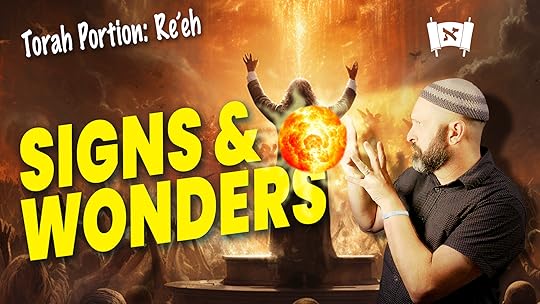 Parashat Re'eh (Deuteronomy 11:26-16:17)
Parashat Re'eh (Deuteronomy 11:26-16:17)In our day a large number of Yeshua’s followers find affinity with the charismatic movement, particularly among those in the Messianic or Hebrew Roots movements. It seems the reasoning behind this attraction is that they are seeking to recapture the power demonstrated by Yeshua’s earliest followers. After all, Yeshua promised power to his disciples upon their receiving the Holy Spirit after his ascension. He told his disciples:
You will receive power when the Holy Spirit has come upon you (Acts 1:8)
This power was evident in the lives of the Apostles. For instance, in Acts 3, Peter and John are on their way into the Temple complex when they encounter a lame beggar and heal him with the spoken word. In Acts 5, Peter is healing so many people that “they even carried out the sick into the streets and laid them on cots and mats, that as Peter came by at least his shadow might fall on some of them” (5:15). In Acts 28, Paul heals a man who is suffering from fever and dysentery (28:8). It seems that everywhere they turned the Apostles were performing signs and wonders.
Many people read passages like these and it awakens a desire within the human psyche to experience this spiritual power. We desire to replicate what we have only read about in our Bibles. The modern charismatic movement is an outgrowth of this desire. It constantly tries to show authenticity through signs, wonders, and prophecies of future events. But there is a strong caution that should accompany this pursuit. This week’s Torah portion speaks to the inherent danger of following after miracles and prophetic voices. It begins by establishing the condition that should capture our attention:
If a prophet or a dreamer of dreams arises among you and gives you a sign or a wonder, and the sign or wonder that he tells you comes to pass … (Deuteronomy 13:2–3[1–2])
By itself, a prophet who performs signs and wonders is not problematic. But the Torah continues to say that even if that prophet performs all kinds of miracles, and foretells events that are confirmed with signs and wonders, he still has to pass the litmus test. A true prophet must uphold the commandments given to Israel through the mouth of Moses. If he does not, then he is to be rejected as a false prophet:
But that prophet or that dreamer of dreams shall be put to death, because he has taught rebellion against the LORD your God, who brought you out of the land of Egypt and redeemed you out of the house of slavery, to make you leave the way in which the lord your god commanded you to walk. So you shall purge the evil from your midst. (Deuteronomy 13:6[5])
There are many people today who are able to produce signs and wonders, predict the future, or even know secret things about a person’s life. But these things alone do not qualify them as a true prophet. The Torah is explicit in that a true prophet must point people back to the instructions given to the Children of Israel on Mount Sinai. The signs and wonders that a prophet works are not an end to themselves. They are only to get people’s attention so that he can instruct them. A true prophet will instruct people to return to the LORD's commandments, but a false prophet will use signs and wonders as a lure to entice people away from what the LORD desires of them.
Although a prophet may promise blessing and good fortune for hearing his word, we are to only listen to the one who speaks on behalf of the God of Abraham, Isaac, and Jacob. If we will heed the true voice of the LORD and follow His instructions, He promises to bless us. But this is only on the condition that we “obey the voice of the LORD your God, keeping all his commandments that I am commanding you today, and doing what is right in the sight of the LORD your God” (Deuteronomy 13:19[18]).
We must remember that not all that glitters is gold. We must know the Word of God and use discernment when we listen to those who claim to speak on behalf of the Almighty. They may be able to produce incredible signs and wonders, but if they lead us in a direction that would be in opposition to the instructions of the Torah then they cannot be trusted. Yeshua made it clear which direction he was pointing his disciples. He instructed them:
Until heaven and earth pass away, not an iota, not a dot, will pass from the Torah until all is accomplished. Therefore whoever relaxes one of the least of these commandments and teaches others to do the same will be called least in the kingdom of heaven, but whoever does them and teaches them will be called great in the kingdom of heaven. (Matthew 5:18–19)
May we continue to heed to voice of the True Prophet, Yeshua the Messiah, who continually points his disciples back to Torah. And may we all anticipate his return each and every day.
August 4, 2023
The Making of a New Man
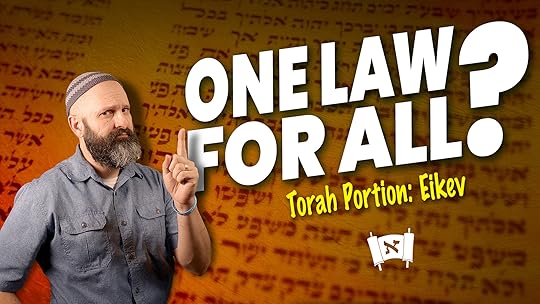 Parashat Eikev (Deuteronomy 7:12-11:25)
Parashat Eikev (Deuteronomy 7:12-11:25)As a reminder, the book of Deuteronomy is largely a recap of the last forty years of Israelite history just prior to their crossing over the Jordan in order to begin taking possession of the land. This week’s portion, like so many others, covers a multitude of subjects, although in the stream of one continuous monologue given by Moses to the Children of Israel. Through this monologue the LORD continually reminds the Israelites of their responsibility to uphold the conditions of the covenant He has charged them with. During this process, He emphasizes the reason they are taking possession of the land He has promised them:
Do not say in your heart, after the LORD your God has thrust them out before you, ‘It is because of my righteousness that the LORD has brought me in to possess this land,’ whereas it is because of the wickedness of these nations that the LORD is driving them out before you. Not because of your righteousness or the uprightness of your heart are you going in to possess their land, but because of the wickedness of these nations the LORD your God is driving them out from before you, and that he may confirm the word that the LORD swore to your fathers, to Abraham, to Isaac, and to Jacob. (Deuteronomy 9:4–5)
In this passage Hashem tells them that they are dispossessing the other nations currently living in the land of Canaan “because of the wickedness of these nations.” But what wickedness is He speaking of and why does He contrast it with righteousness? Wickedness and righteousness are terms that are on the opposite ends of the spectrum in terms of legal responsibility. If a person is righteous they are legally fulfilling their responsibility within an agreement, whereas a person is deemed wicked by failing to fulfill their end of an agreement. With this in mind, how does Hashem define the righteousness or the wickedness of the nations? What standard of righteousness are they held accountable to?
As far as Israel is concerned, the Torah is explicit concerning their obligation to fulfill the commandments of the Torah. Last week we discussed the fact that Israel’s righteousness is defined according to the standard they were given at Sinai (see Deuteronomy 6:25). These have traditionally been enumerated as a total of 613 commandments, which include some of the more notable ones such as the keeping of the Sabbath, the dietary laws, the wearing ritual fringes, etc. But are the nations held to the same standard of righteousness that was given to Israel? Were the Canaanite nations being judged because they didn’t keep the Sabbath, eat kosher, or wear tzitzit? If not, then by what criteria did the LORD judge these nations that Israel was to dispossess?
According to most authorities, the nations are judged by the standard given to Noah in Genesis 9 after coming off the ark. The laws derived from this chapter are called the Noahide laws. These Noahide laws are categorized into seven broad categories, which include six prohibitions and one obligation. They forbid denying God, blaspheming God, murder, sexual immorality, stealing, and eating the limb of a living animal. There is also the obligation of establishing a system of just courts. These are the basic laws by which those among the nations are judged.
This begs us to ask yet another question. What about those of us among the nations who have attached ourselves to Israel through accepting Yeshua as the Messiah? How will we be judged? Will we be held to the same standard as the nations or that of Israel? This is the question the Apostles wrestled with in Acts 15. They came to the conclusion that believers in Yeshua from among the nations seem to be in a category somewhere between the two. They weren’t simply Gentiles anymore, but yet they weren’t Jews either. Therefore, they looked into the Scriptures to find an answer to this situation and made the decision to put them into the same classification as the stranger who sojourns among Israel, giving them four prohibitions:
Therefore my judgment is that we should not trouble those of the Gentiles who turn to God, but should write to them to abstain from the things polluted by idols, and from sexual immorality, and from what has been strangled, and from blood. (Acts 15:19–20)
This is based on the directives of Leviticus 17:8–18:26 that spell out the obligations of the stranger who sojourns with Israel. Thus, through Yeshua there is the creation of “one new man” Paul speaks of in Ephesians 2, whereby the former Gentile receives a new identity in Messiah. He is no longer a Gentile, but neither has he become a Jew. He has, however, become something beautiful in the eyes of Hashem. He has become a new creation, as Paul taught the congregation at Corinth, “If anyone is in Christ, he is a new creation. The old has passed away; behold, the new has come” (2 Corinthians 5:17). And although we will not be held to the exact standard as our Jewish brothers and sisters, the bar has been raised and we must work to realize the implications of such.
July 28, 2023
No Religious Discounts
 Parashat Va'etchanan (Deuteronomy 3:23-7:11)
Parashat Va'etchanan (Deuteronomy 3:23-7:11)I don’t know about you, but I’m a bargain shopper. I love to find the discounts whenever I can. It can be a fun challenge and every penny we save with our large family adds up. But some people are much more serious bargain shoppers than I am. They don’t buy anything without a discount, and if they can’t find the discount they are looking for they will haggle with the merchant until they can get the item marked down to some degree or another. And while that level of tenacity can be appreciated in some ways when it comes to shopping, when we try to apply this instinct to religious practice it can actually work against us.
You may not know it, but deep down within us we are all bargain shoppers and hagglers when it comes to religious expression and we need to be aware of it so that we can avoid falling into its trap. For instance, if we don’t feel like praying one day we may try to bargain our way out of it. We begin rationalizing with ourselves, “My prayer time yesterday was really good. It won’t be so bad if I miss today.” Or maybe it’s finding a congregation: “Their service is too long,” or “I don’t like all of the Hebrew,” or “That person annoys me.” Maybe it’s observing the appointed times: “The Sabbath is the only time I have to get things done.” Maybe it’s observing kosher: “God looks on the heart, not the stomach,” or “Our culture isn’t conducive to separating meat and dairy.” Whatever the case may be, we are quick to try and get our spiritual benefits at a discount. But Hashem doesn’t offer discounts when it comes to obedience.
In this week’s portion, we read about the need to pass down faithful observance of the Torah to subsequent generations, and what Hashem expects from a people He has redeemed from slavery:
When your son asks you in time to come, ‘What is the meaning of the testimonies and the statutes and the rules that the LORD our God has commanded you?’ then you shall say to your son, ‘We were Pharaoh's slaves in Egypt. And the LORD brought us out of Egypt with a mighty hand. And the LORD showed signs and wonders, great and grievous, against Egypt and against Pharaoh and all his household, before our eyes. And he brought us out from there, that he might bring us in and give us the land that he swore to give to our fathers. And the LORD commanded us to do all these statutes, to fear the LORD our God, for our good always, that he might preserve us alive, as we are this day. And it will be righteousness for us, if we are careful to do all this commandment before the LORD our God, as he has commanded us.’ (Deuteronomy 6:20–25)
The LORD concludes this section by commanding the Children of Israel to pass down His commandments to their children and grandchildren, and remind them that their faithfulness to the details of these commandments will be reckoned to them as righteousness. He says that they are to tell their children, “And it will be righteousness for us, if we are careful to do all this commandment before the LORD our God, as he has commanded us” (6:25). Just a few verses previously He reminds them that they are not only to keep the commandments, but they are to keep them diligently:
You shall not put the LORD your God to the test, as you tested him at Massah. You shall diligently keep the commandments of the LORD your God, and his testimonies and his statutes, which he has commanded you. (Deuteronomy 6:16–17)
The cost of Hashem’s mitzvot are premium because they aren’t cheap imitations; they are handcrafted and tailored for us by The Master Craftsman. We can’t try to haggle for discounts and expect the blessings that come with them. But if we pay the premium price for them we will receive their maximum dividends. When we give our all, even when we don’t meet our own expectations, it is beautiful in His eyes and He rewards us for it. Rather than looking for a bargain or even a loophole when it comes to our spiritual service, we should be looking to pay retail and maybe even adding a tip.
Tags: deuteronomyva'etchananJuly 20, 2023
Moses & The Rabbis
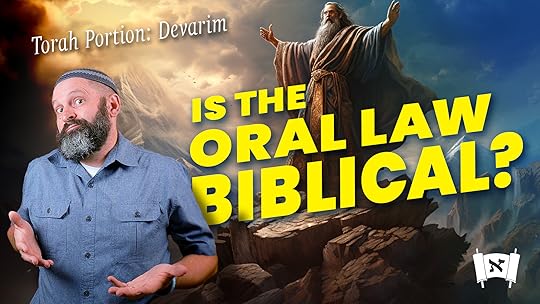 Parashat Devarim (Deuteronomy 1:1-3:22)
Parashat Devarim (Deuteronomy 1:1-3:22)Our parashah begins the final book of the Torah, the book of Deuteronomy. Sometimes the book of Deuteronomy is also known as Mishneh Torah, or the Repetition of Torah, since it contains a recap of many of the major themes included the previous books of the Torah. It also begins by recounting the various events that have taken place among the Children of Israel since the Exodus. A curious statement is made, however, that we must explore:
Beyond the Jordan, in the land of Moab, Moses undertook to explain this law, saying … (Deuteronomy 1:5)
The Children of Israel had wandered in the wilderness for the last forty years and had now made it to the land of Moab on the east side of the Jordan. But rather than immediately sending them over, Moses stops and begins to explain some important details of the Torah. What were those details? That’s a really good question.
Many people make the mistake of thinking that every detail of the Torah’s instructions is spelled out within the Torah itself. However, we have plenty of examples of why this cannot be the case. The most obvious is that of Shabbat, the Sabbath. For instance, the LORD commanded the children of Israel to keep the Sabbath, and that anyone who profanes the Sabbath shall be put to death (Exodus 31:14–15). However, the Torah does not provide any details of what types of work are considered to violate the Sabbath. Since the elders of Israel are responsible for trying cases such as this to determine if the crime is worthy of such a serious decree as the death penalty, it becomes immediately apparent that the definitions of “work” and “profaning the Sabbath” are critical in judging the outcome of such cases.
Two questions immediately arise: What constitutes work, and who has the authority to interpret the definition of work? In other words, does each person have the ability to determine what is work for themselves, or is there a common standard established that all of Israel must adhere to? Details and decisions like this had to be made clear to the Israelites before Moses departed. As we can see alluded to here in our parashah, these details were explained to the Children of Israel (vs. 5), reminding them that the heads of the tribes had been given charge of making legal rulings on his behalf under the leadership of Joshua (vs. 9–18), and that since their authority was given to them by Moses, it also came “from Sinai,” as recorded in Pirkei Avot:
Moses received the Torah from Sinai, and transmitted it to Joshua, Joshua to the Elders, the Elders to the Prophets, and the Prophets transmitted it to the Men of the Great Assembly. (m.Avot 1:1)
These legal decisions were at first recorded orally, and then eventually written down at a much later date. They were passed down from one generation to the next in order to equip the leaders among the people of Israel. The Oral Law, or the Mishnah, therefore, is the compilation of legal decisions and case precedents passed down from generation to generation beginning with the time of Moses. Before it was ever written down, it was taught orally from teacher to student in order that it remain flexible, but not be forgotten. After the destruction of the Second Temple during the Roman period, it became important for this information to be collected and committed to writing so that it not be lost. This compilation has served as a collective repository of these oral transmissions ever since. It is a critical component of Judaism, detailing the specifics of how the Torah is to be lived out, and determining the legal definitions of what it means to either break or fulfill the commandments found within the Torah.
The Torah was given as the skeleton, intentionally lacking in many details how it is to be observed. It is the job of the rulers of Israel to put flesh on it by explaining how it is to be lived out. This is why Yeshua can confidently say, “The scribes and the Pharisees sit on Moses' seat, so do and observe whatever they tell you” (Matthew 23:2–3). The scribes and Pharisees in the days of Yeshua would eventually become the rabbis of the Mishnah and Talmud.
Do they disagree with the decisions of Yeshua and the Apostles? Occasionally, but not that often. We have to remember that sometimes lower courts and higher courts disagree, but it is always the higher court’s ruling that stands. Even though the higher court may come to different conclusions than the lower courts, it does not disband the lower courts, but trusts them to handle rulings until the time is needed for it to intervene. Yeshua entrusted the leaders of Israel to continue leading his people in his absence, with the ultimate authority lying with him and his Apostles.
The next time we casually dismiss something as being “rabbinic,” let’s remember that if Moses had to expound on the Torah to make it viable for those living in his day, how much more so do we need exposition of its principles today by those who have been entrusted with its wisdom.
Tags: deuteronomydevarimRabbisMosesoral lawrabbinictraditionJuly 14, 2023
The Death of the Righteous
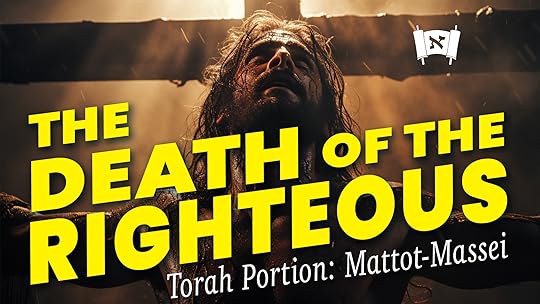 Mattot-Massei (Numbers 33:1-36:13)
Mattot-Massei (Numbers 33:1-36:13)The details of the cities of refuge are spread out over three sections of the Torah: Exodus 12, Numbers 35, and Deuteronomy 19. In our current Torah portion, we learn that a manslayer must undergo investigation in order to determine whether or not he qualifies for protection within a city of refuge. He is to appear before a court in order to determine his qualification. If he is not at fault, then he is free and does not have to enter the city of refuge. If he is guilty of ill-intent, then he is to be executed. However, if he is basically guilty of some type of negligent homicide, then he is to flee to the city of refuge where he will be protected from the go’el (גאל), the redeemer of the one slain (Numbers 35:9–12).
Additionally, we learn the length of time he must remain in the city of refuge if this is his fate. Curiously, it is not a fixed amount of time, but one based on an unknown variable. The manslayer is to remain in the city of refuge until something happens to end his confinement:
And the congregation shall rescue the manslayer from the hand of the avenger of blood, and the congregation shall restore him to his city of refuge to which he had fled, and he shall live in it until the death of the high priest who was anointed with the holy oil … For he must remain in his city of refuge until the death of the high priest, but after the death of the high priest the manslayer may return to the land of his possession. (Numbers 35:25, 28)
Unlike any other sin or trespass enumerated within the Torah, manslaughter is unique in that an obscure penalty is associated with it: confinement to a city of refuge for an unknown time period. Why was this penalty assigned? What relationship does a manslayer have with the high priest that the fate of the one is bound to the other? Rashi proposes that they are both tied to the presence of the Shechinah in Israel. He says that the merit of the high priest caused the Shechinah, the Divine Presence, to dwell among Israel, while the manslayer caused the Shechinah to depart from Israel. And since these two work in opposition to one another, the manslayer was to remain isolated in the city of refuge away from the high priest.
Does this connect in any way to Yeshua’s death? Traditionally, the death of Yeshua has been seen as a fulfillment of the Torah’s sacrificial system. According to the traditional interpretation of the book of Hebrews, Yeshua is seen as the sacrifice to end all sacrifices. His death would forever replace the Levitical system. However, anti-missionaries are quick to point out that Yeshua’s death does not fit the requirements for a valid sacrifice according to the laws of Torah. Just as the Torah does not accept the sacrifice of dogs, cats, elephants, or any other unkosher animal, human sacrifice is not an acceptable sacrifice either. Only bulls, goats, lambs, and a few birds qualify according to the Torah’s specifications. As a matter of fact, it strictly forbids human sacrifice:
Take care that you be not ensnared to follow them, after they have been destroyed before you, and that you do not inquire about their gods, saying, ‘How did these nations serve their gods?—that I also may do the same.’ You shall not worship the LORD your God in that way, for every abominable thing that the LORD hates they have done for their gods, for they even burn their sons and their daughters in the fire to their gods. (Deuteronomy 12:30–31)
But if Yeshua’s death wasn’t for the purpose of fulfilling (and thereby putting an end to) the sacrificial system, how do we benefit from his death? In our Torah portion, we learn that, despite anti-missionary objections, the death of the righteous brings atonement. In the case of the manslayer, the death of the high priest brought about atonement on his behalf. We can easily see the connection to Yeshua.
According to the author of Hebrews, Yeshua is a high priest but not in the line of Aaron. He is a high priest in the order of Melchizedek, as it says, “Jesus has gone as a forerunner on our behalf, having become a high priest forever after the order of Melchizedek” (Hebrews 6:20). Melchizedek didn’t minister in the Levitical Tabernacle and neither did Yeshua: “Now if he were on earth, he would not be a priest at all, since there are priests who offer gifts according to the law” (Hebrews 8:4). His ministry is not in the earthly Tabernacle but in the heavenly Tabernacle, where he appears before God on our behalf (Hebrews 9:24). Therefore, his priestly role, although it doesn’t replace that of the divinely ordained levitical priesthood, is greater than the one operating in the Tabernacle and Temple.
Just as the death of the Levitical high priest brings atonement to the manslayer and allows him to be released from captivity and returned to his family, the death of Yeshua, our heavenly high priest, is a means by which we can be released from our own self-imprisonment and return to our heavenly Father. Yeshua died as the heavenly high priest on our behalf in order to make this possible. May his merit continue to provide blessing and atonement for all who call on him until his return.



